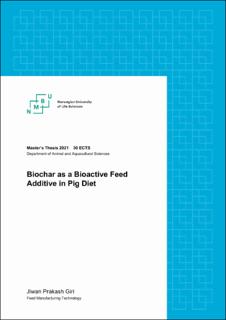| dc.description.abstract | Biochar is a porous, carbonaceous pyrogenic substance produced by pyrolysis of biomass at a temperature ranging from 350 ◦C to 1000 ◦C, whereby organic materials are decomposed in a lowto-no oxygen environment. Evidence suggests charcoal use as a traditional feed additive in animal production dates back centuries, largely to treat livestock digestive issues. Modern biochar studies on supplementing farm animal diet with biochar have been reported to exert a multitude of benefits including improved animal health, digestibility, feed consumption, feed efficiency, growth performance, pathogens infestation, detoxification of contaminants, and reduced enteric methane production among many other benefits. The enhanced performance of farm animals with biochar supplementation is mainly because of its adsorption capacity, in addition to other benefits, towards mycotoxins, pesticides, and pathogens that would otherwise hinder the performance. However, the result is dependent on the characteristics of biochar such as porosity, specific surface area, pH, aromaticity and, type and abundance of functional groups on the surface. These characteristics, in turn, are determined by the feedstock characteristics and pyrolysis conditions. However, in
addition to adsorption of contaminants, biochar can potentially adsorb feed nutrients and pharmaceuticals and shift the gut microbiome composition upon long term use, which pose a major limitation in the long-term use of biochar as feed additive.
The objective of this study was to investigate biochar, as a supplement to compound feed, regarding its influence on growth performance and some other wellbeing parameters including diarrhea, stress, and joint problems. A total of 84 pigs (42 control and 42 test pigs) with 90 days of age and an initial average body weight of 56.62kg were housed in 8 pens, 8-12 pigs a pen, 4 pens with control pigs, and the other four with test animals. Treatments were control diet (no supplementation of biochar) and test diet (0.5% of pine wood biochar fed separately from the slurry compound feed). Weight gain was scaled every 2/3 weeks and data was registered for all other measured wellbeing parameters during the 60-day feeding trial. Statistical analysis conducted at the end of the experiment did not reveal any significant difference in weight gain performance between the two treatments. Likewise, no such incidences of diarrhea and joint problems were observed to conclude the effect between the treatments during the course of the experiment. Regarding the tail bitten incidence as a measure of stress, one pig in each treatment group was identified as tail bitten, and thus, biochar was not found to have an effect. Unlike the considerable number of documented results indicating positive tendencies regarding the efficacy of biochar in enhancing weight gain performance, this study does not conform to previous findings on the subject. | en_US |

